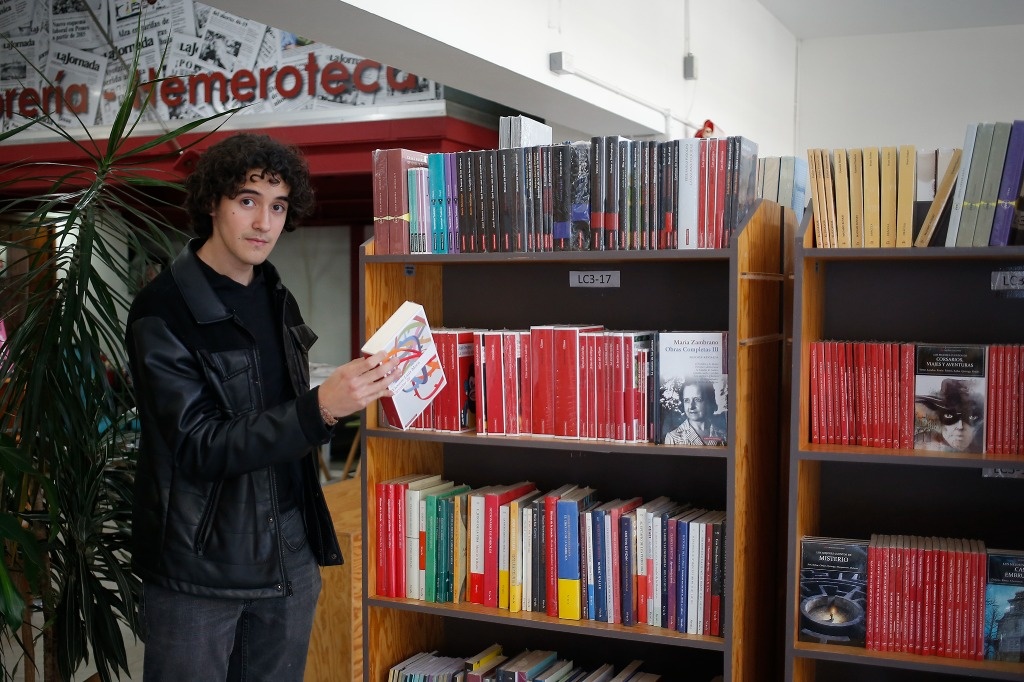Mexico City. Javier Alberto López Espinosa, a 17-year-old young man and second-year high school student at La Salle, does not hide his enthusiasm, because in a few weeks he will hold a five-day camp at the European Organization for Nuclear Research (CERN, for its French acronym). ), based in Geneva, Switzerland, an ideal place for physics students, since the Large Hadron Collider is located there.
Thin, with pale skin and curly hair, since 2020, in addition to taking his high school classes, he attends a reading club on Fridays. He also divides his time between participating in mathematics competitions, in the research group of the Adopt a Talent Program (Pauta) of the National Autonomous University of Mexico (UNAM), in which he builds an electromagnet, and in the La Salle MoonCamp. , specialized in skills on space projects.
Despite his busy schedule, he arrived on time for the interview with The Conference. He sat in one of the blue armchairs in the newspaper’s bookstore, and without any pretense, he said that of more than 650 young applicants for the stay, from more than 80 countries, he was the only Mexican selected, something that Fall from the sky
.
That’s not true at all. In order for López Espinosa to be one of the 30 young people who will participate in the camp, he had to complete a rigorous selection process, which included several phases and requirements.
Among the errands he did, he obtained a letter of recommendation from Sheila Natalia Flores Durán, an astrophysicist at UNAM, who a year earlier was his physics mentor. She also wrote eight short essays in order to answer various questions, such as what do you do outside of school about science? How do you hope to share your knowledge? What do you hope to do about science afterward?
“One of the most important conclusions I came to was based on the question: ‘What has been your best collaborative experience?’, which was building a castle in Minecraft, made of 3 million blocks, with all my friends along “After the pandemic, that connected us a lot as a team, and when it came time to create a website for local markets, we were able to do it quickly, because we knew the strengths of our colleagues.”
In addition, López Espinosa explained what his educational system was like, what his academic profile was, he verified his efficiency in English, sent a copy of his grades and, as an extra certificate, presented the recognitions obtained in mathematics contests.
Two months into the application process, while taking notes in his biology class, he received an email from CERN. The notification made him jump at his desk, and receive a reprimand from the teacher on duty. When he was able to leave the room and check the mail in detail, there was no doubt: he had earned a place to go to camp.
López Espinosa will be at CERN from May 26 to June 1, where he will learn about the Large Hadron Collider and will be able to speak with prominent exponents of physics.
I want to make contributions to national development
Getting there, what I want is to bring together the MoonCamp projects, the Pauta Program, the knowledge that I have acquired in mathematics, and take advantage of them to make contributions to the scientific development of Mexico, because here we have great figures who inspire us a lot
he said.
The young man added that he is interested in knowing the nest
of the Belgian physicist François Englert and the British Peter Higgs, who won the 2013 Nobel Prize in Physics, for having postulated the existence of the subatomic particle known as the Higgs boson.
López Espinosa has several references in the field of science; for example, the Mexican physicist Miguel Alcubierre Moya, who developed a concept named after him. Another source of inspiration is Cristóbal Miguel García Jaimes, known as the particle boy
who at the age of 17 created the cheapest particle accelerator on the planet.
They are people who tell us that talent in Mexico is boiling, and we just need to uncover it
said López Espinosa, who is far from considering himself genius
. He highlighted that before the Covid-19 pandemic, his school average was 7.6, he did not even know how to divide tables by heart, and he had accumulated more than 350 hours in Pokémon. “Geniuses do not exist, they are created in people who find their passion and spend time studying it.
“One day, lying in my bed, I realized that I had five undelivered assignments and I remember that with nothing else to do I said: ‘I have to get myself in order, I’m not going to be 12 years old again, from here on I’m going ‘Being older, I have to put myself in order’. As I began to work hard, my grades began to rise, and I began to delve into this passion: I want to be a particle physicist.”
The infrequent visitor to Muay Thai and a regular reader of philosophy texts, believes that the fundamental thing in a person’s life is finding their passion.
People would be surprised to spend a week finding their passion, and start working on it, because when you do, your world changes.
concludes the young man, who was holding a copy of The Conference.
#Javier #López #Espinosa #fulfill #dream #visiting #Large #Hadron #Collider
– 2024-04-10 07:31:38
